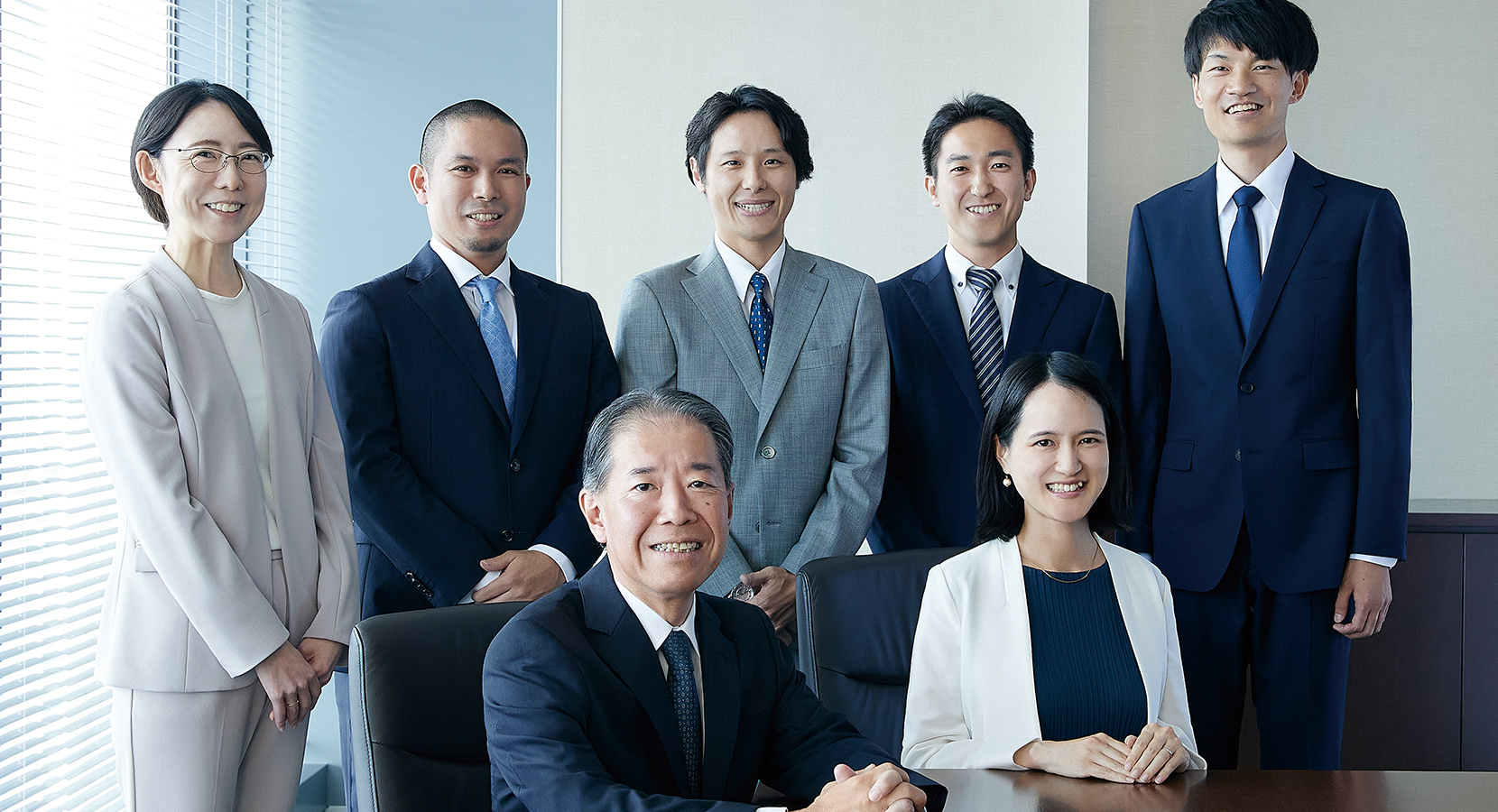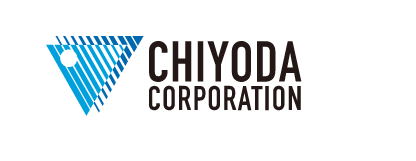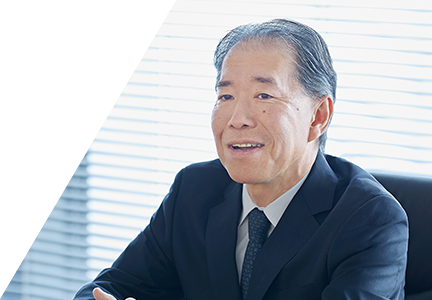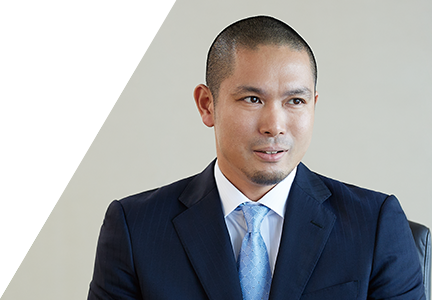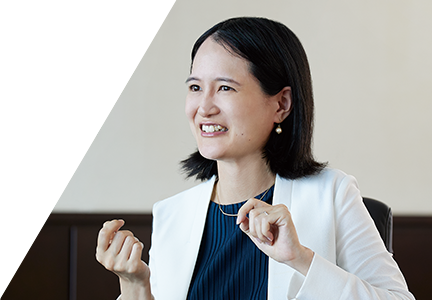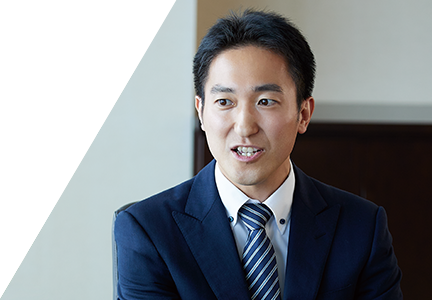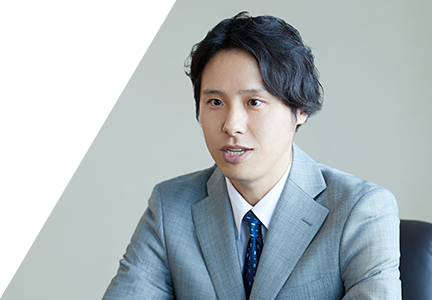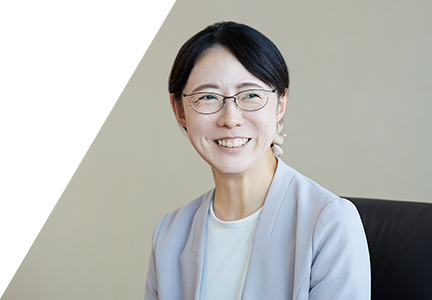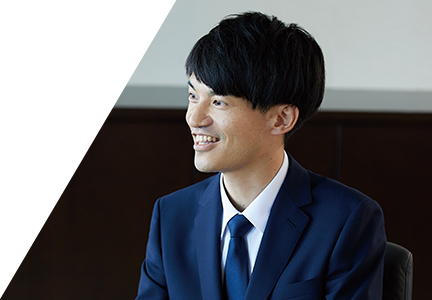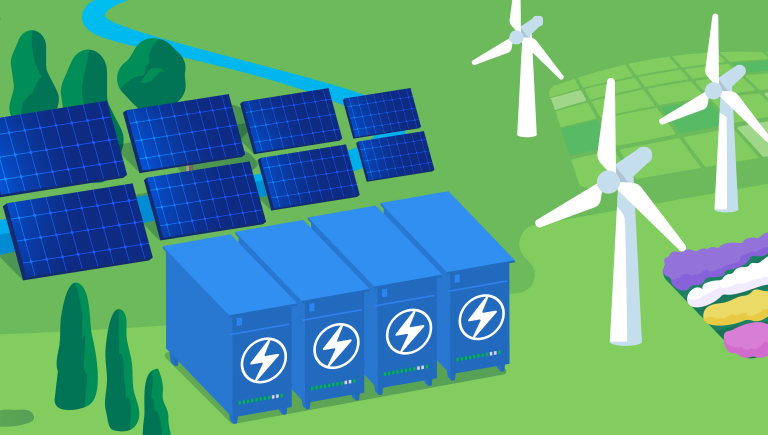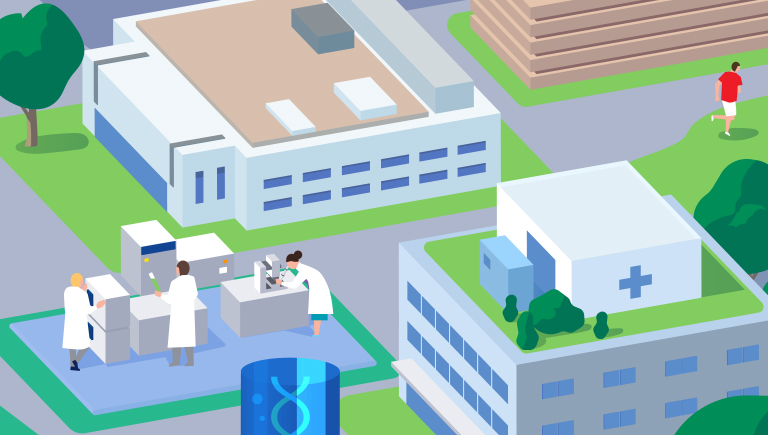
Realizing Our Purpose through Materiality Initiatives
Ota
For many years, the Chiyoda Group had a stated mission of ‘Energy and Environment in Harmony’ and sought to achieve this goal by shifting focus from coal and oil to LNG in the advancement of its business. However, in recent years our mission has expanded beyond the scope of ‘Energy and Environment in Harmony.’ In consideration of this, we formulated our new purpose in 2023 as a guiding light to once again share a common direction encompassing the entire Group. We have redefined five materiality issues to address in order to realize our new purpose: ‘Society with Reduced Environmental Impact’ under E (environment), ‘Prosperous and Healthy Lifestyle,’ ‘Organizational Culture that Enables Diverse Human Resources to Challenge Value Creation’ and ‘Human Resources Addressing Social Issues Autonomously’ under S (social), and ‘Equitable and Fair Corporate Management’ under G (governance).
I look forward to today’s discussion with young and midcareer employees, including hearing about everyone’s vision of our purpose, ‘Enriching Society through Engineering Value,’ and how we can achieve it through our materiality initiatives.


Yamazaki
The meaning of ‘Enriching Society through Engineering Value’ changes with the times, but I think the transition to a decarbonized society is a big part of it today. My current work is related to CCS*1, which involves capturing and storing CO2 emitted from plants. Through realizing a ‘Society with Reduced Environmental Impact,’ I hope to contribute to the transition to a decarbonized society. In working towards decarbonization, while there is a broad target of reaching carbon neutrality by 2050, setting out concrete steps to achieve that is a difficult issue, even for our customers. Against this backdrop, engineering companies are expected to find and propose the optimal solution among limitless options. The CCS projects that I am working on are currently at the FS*2 and FEED*3 stages, and I hope that correctly evaluating the feasibility of projects through early-stage studies, then putting forward proposals that are optimal for customers’ projects as a whole, not just the individual plants for which the Chiyoda Group is responsible, can enhance practicality and achieve the steady completion of plants, thereby leading to the resolution of materiality issues. While it may be indirect, I hope to contribute to the realization of ‘Enriching Society through Engineering Value’ by putting importance on broad perspectives while guiding our customers’ projects to success.
- 1:Carbon Capture and Storage : Technology used to capture and store CO2 emitted from plants
- 2:Feasibility Study : Creation of a conceptual design and evaluation of the practical and commercial viability or otherwise of businesses from various perspectives
- 3:Front End Engineering Design : Basic engineering carried out after the conceptual design and FS, comprises studies covering technical issues and estimation of rough investment cost

Honda
At the Frontier Business Division, I’m currently working on the creation of new businesses that can lead to realizing a ‘Society with Reduced Environmental Impact,’ including VPP*4 and chemical heat pumps. Ensuring that decarbonization initiatives can be feasible as businesses is also important from my perspective. Initiatives to reduce the burden on the environment are required but bring with them significant costs. Businesses need to pursue profitability in addition to contributing to society, and reducing the burden on the environment must lead to the creation of value, rather than simply being an additional cost. When moving projects forward, I constantly think about setting out a path that makes the transition to decarbonization viable from a business perspective, including the extent and duration of resulting costs and the avenues for commercialization. This is not simple in projects without a precedent. However, I hope to leverage our strengths as an integrated engineering company that uses wide-ranging technologies not limited to one particular area, constantly seeking the optimal solution as we move towards social implementation alongside our customers.
- 4:Virtual Power Plant: Trades value based on power adjustment capacity, contributing to a stable power supply balance
Hanawa
Like Mr. Yamazaki, I am involved in CCS projects. I feel that customers find it difficult to formulate concrete approaches that enable them to achieve their targets. Our customers are seeking to set out more concrete paths themselves, and it is important that we correctly understand their priority areas. From this foundation, leveraging our deep understanding of elemental technologies, we can optimize seemingly contradictory elements such as processes, costs and resources, in consideration of our customers’ position in society and the broader social landscape in addition to our customers’ own wishes. This is a strength that the Chiyoda Group has built up as an integrated engineering company, having worked on plant EPC
*5 for many years. I feel a strong desire from customers for us to demonstrate these strengths, particularly when proceeding through the steps leading up to social implementation, such as FS and FEED. I hope to achieve enrichment for our customers by considering the optimal overall approach for them, then engineering the specific path to achieve their targets.
- 5:Engineering, Procurement and Construction

Kitazawa
I am currently working on cost estimation for a project in North America. In terms of business transformation, I think this project can become a role model that reduces the risk of projects. In EPC, ascertaining risks is the most important issue. North America, in particular, is a region with numerous opportunities but also significant risks. The project that I am currently working on has complex, intertwined risks, so we are carrying out thorough identification of risk areas and establishing countermeasures for each of them as we create cost estimates. This method of identifying risks and formulating countermeasures could be a role model for future projects in North America, but also provide a general basis for risk management in EPC, regardless of region or business area. In addition, as a basis to support new business creation and expansion, my current work plays an important role in securing profitability in existing businesses, and I hope to come up with optimal solutions while contributing to the realization of our purpose.

Nakamura
My work at the Life Science Project Department involves pharmaceutical plants. I interpret ‘Enriching Society through Engineering Value’ broadly and believe it refers to what people and the environment seek to achieve happiness. In that context, I believe that the Life Science Business can contribute to the realization of a ‘Prosperous and Healthy Lifestyle,’ which is one of those needs. I was previously engaged in EPC for LNG and ethylene plants and it was rewarding to provide various products to wide-ranging users through the materials created, albeit indirectly. While pharmaceutical plants are smaller-scale than gas and chemical plants because they manufacture medication for patients with specific conditions, the fact that products made in plants that Chiyoda built go directly to end users is one thing I find very appealing. I was involved in constructing a vaccine constituent production facility in 2021 and am currently working on the construction of a pharmaceutical plant that manufactures therapeutic drugs. These projects have huge social significance in terms of strengthening economic security and contributing to safety and peace of mind for patients suffering from illnesses. The concept of strengthening domestic pharmaceutical supply chains has gained prominence in recent years, and the pharmaceutical market is also a core field of business in which the Chiyoda Group has leveraged its expertise from the petroleum and chemical fields to build up an extensive track record. By carrying out and completing reliable construction without delays, I aim to contribute to addressing materiality issues and to Chiyoda’s growth, working with a strong sense of mission day by day.
Tezuka
I am involved in corporate DX initiatives as part of the CDO Office.*6 I believe that I can contribute to realizing an ‘Organizational Culture that Enables Diverse Human Resources to Challenge Value Creation’ and ‘Human Resources Addressing Social Issues Autonomously.’ I imagine that everyone participating in today’s roundtable discussion has established some idea of their own career path and who they want to become over the course of their career with Chiyoda. However, I feel that the Company does not have sufficient documentation and tools setting out clear career options, meaning the environment does not currently enable employees to be autonomous in their own careers. To resolve this issue, we at the CDO Office are currently working to promote talent management. Specifically, we are aiming to expand employees’ careers and range of possibilities through a system that consolidates information such as work experience and project histories for all employees and by visualizing talent career and development paths. From a company perspective, this can also identify gaps between our current status and strategic human resource development and allocation that aligns with business plans. I will continue these efforts to work together and create an ideal environment in which each employee’s hopes for their career match the type of human resources sought by the Company.
- 6 :An organization operating under the Chief Digital Officer that aims to transform business processes, improve project execution capabilities and accelerate implementation of Companywide DX initiatives
Ota
As companies’ social responsibilities have come under greater scrutiny in recent years, the issues faced by our customers have become more complex. As a result, it is more difficult for customers to come up with solutions alone. Against this backdrop, as everyone has described, we are expected to rationalize customer requirements and utilize wide-ranging technologies and expertise to propose feasible solutions. As an integrated engineering company, this is one of the Chiyoda Group’s major strengths. With issues becoming more complex and with wide-ranging elements to consider and fields to cover, in order to put forward optimal solutions, it is important to actively make use of external partnerships in addition to those within the Company as we put proposals to customers. Moving forward, I hope to see everyone take ownership of customers’ issues and work to find solutions. In addition, while DX and human resource development may not appear directly related to our business at first glance, they are actually crucial. These initiatives, including developing talent capable of making the type of proposals described earlier and creating an environment where employees are encouraged to take on new challenges, form a foundation that will significantly impact the Chiyoda Group as a whole. In terms of human resource development, in particular, we are focusing on the appropriate allocation of human resources with the aim of enabling each employee to build up wide-ranging experience and enhance the Company’s response capabilities. As a result of actively transferring human resources across business fields in recent years, I feel that we have also expanded the Company’s scope. Moving forward, we will advance human resource development and allocation that takes a Companywide perspective, including transforming our awareness, in order to further leverage Chiyoda’s strengths.

Working to Realize Our Vision
Honda
My current vision for myself is to contribute to the Company by achieving profitability in the new business I am working on. Working in fields without precedent means that trial and error is required for the establishment of national systems and the social implementation of new technologies. As a result, it is not possible to produce instant results, and we have gone through the process step by step. However, in recent years, it has come to be a business that is focused on in internal liaison meetings and the Medium-term Management Plan, and there are signs that commercialization is advancing. Taking encouragement from this, I hope to overcome the first hurdle of achieving profitability, then expand this business field in the future. To achieve our targets, in addition to more in-depth work on technologies, I will focus on enhancing collaboration with related departments and strengthening our organization.
Teduka
From the perspective of someone working in a corporate division, I want to make the Chiyoda Group a place where employees experience high levels of satisfaction and happiness in their work. This also applies to our current corporate DX efforts, including talent management, which I believe will ultimately lead to greater satisfaction and happiness for employees. The Chiyoda Group’s DX initiatives are currently at the stage of digitization aiming to break away from paper and digitization through shifting to electronic business processes, but my next target is to take the next step and achieve digital transformation that transforms the business processes themselves. Moving forward, I will strive to further enhance collaboration with business departments and transform business processes to align with their needs.
Yamazaki
As a counterpoint to those like Ms. Honda, who are working to provide new value in new businesses through trial and error, I have experienced fields such as CCS where the national government decided to provide subsidies, leading to ready demand and orders from customers. I experienced the difficulty of creating a market by oneself and the fact that our orderbased business is easily affected by fluctuations in demand and customer trends. This is also true in my department, where engineering work centered on LNG was the mainstream before CCS-related work suddenly accelerated. Significant time and effort are required for the Company to create a market, but ascertaining the balance of risks and returns is also important when selecting large projects in markets with established demand. Against this backdrop, I feel that we need to think about our vision once again, including the markets that the Chiyoda Group will take on moving forward and the way in which it will do so. At the same time, the Chiyoda Group has a track record of responding flexibly, even to sudden demand, and I think this ability to respond to changes in the environment is our biggest strength. That type of flexibility will also be important in realizing our vision. As a mid-career employee, I hope to be actively involved in fostering human resources who can respond with agility to any situation.
Kitazawa
I had the opportunity to take part in a debate about what EPC should be in the future. The focus was on whether we should continue to pursue large projects or concentrate on medium-sized projects that can be completed in less time to enable younger employees to build up experience. Each approach has upsides and downsides, and the business environment around us is undergoing significant change, so I think we need to once again discuss what EPC should be like, including aspects other than project size. Beyond EPC, in order to set out a Companywide vision, it is important to thoroughly discuss what the Chiyoda Group’s core business is and clarify the areas that can be changed and those that should be maintained. As a guide for the whole Company to move in a united direction, mid-career employees such as myself must also take the initiative in considering these matters.
Nakamura
As an order-based business, contractors such as the Chiyoda Group tend to always end up in a weak position relative to customers. In Japan, in particular, I feel that the attitude of always following customers’ instructions and requirements is deeply rooted in the Chiyoda Group. In addition to this situation, with costs rising due to soaring material and labor costs in recent years, I see risk-return balancing negotiations with customers to reflect these increases as the biggest issue facing contractors. In order to secure profits commensurate with the value provided by the Chiyoda Group and create better working environments for our employees, I believe that being able to exchange opinions with customers on an equal footing and building partnerships based on understanding is the ideal scenario. To do this, providing value that customers recognize is an absolute prerequisite. In the pharmaceutical plant projects I am currently working on, too, I will not be bound by conventional roles and will actively propose ways to enhance productivity, reduce costs and further improve quality.

Hanawa
I also think that being on an equal footing with customers and exchanging opinions as we proceed with the work is the ideal situation. I feel that the relationship with our customers is relatively equal during the FS stage, and we are able to have discussions on the same level in many cases. If we can establish a trusting relationship during the initial stages before the specifications are determined, like during FS, I think this can lead to the preservation of that equal relationship during FEED and EPC. In an FS project that I worked on in 2023, the customer was impressed by the value that the Chiyoda Group provided and stated that they would be delighted to also proceed to FEED together. Establishing such partnerships with customers in the initial stages of more projects will lead to improved profitability. While FS and FEED projects are smaller in scale than EPC, the risk is low, so I believe there is merit in considering a method of building up profits by providing good value in isolated FS and FEED projects without it necessarily having to lead to an EPC contract in the end.
Ota
Mr. Kitazawa spoke about what EPC should be, and I am aware of the extremely important role that EPC plays in securing profits as a foundation for growth, as the creation of new businesses takes time. In addition, as we expand our engineering to even more fields in the future with new businesses, leveraging the experience and expertise that we have built up in EPC to put forward proposals that take procurement and construction into consideration ought to be a major strength of the Chiyoda Group. However, securing EPC orders does not have to be the goal of every project. Up to this point, we have pursued EPC as a business model that leads to the greatest profits, however, risks are currently growing larger and the time when we must reconsider whether this is the optimal choice is coming. By putting our engineering know-how refined through EPC to use in new ways, we should try establishing a new business model based on building up profits over the long term, rather than single large-profit projects. To do this, as Mr. Nakamura and Mr. Hanawa mentioned, we should move from being contractors who make things upon request to being part of partnerships. We are actually starting to try this approach of participating in projects as partners to our customers in life sciences, where we have invested in a pharmaceutical Contract Development and Manufacturing Organization (CDMO) project.
As everyone has said today, the Chiyoda Group has a significant role to play in opening up a path for problem-solving that can help to achieve our customers’ visions, and there is no doubt that we can provide value. However, the form that this value takes must be determined by making our purpose even more concrete and be based on the vision of everyone at the Chiyoda Group. I hope to see the talent upon whom the future depends have debates considering every possibility. We will continue to actively create these forums for discussion, and I look forward to seeing everyone work together to consider and set out a vision for the Chiyoda Group in order to realize our purpose.



